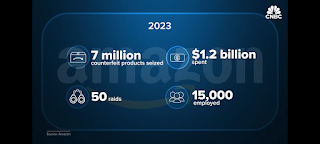Here are some youtube videos, or articles that caught my eye - from the New York Times, Consumer Reports, Popular Science etc.
Tuesday, December 31, 2024
Radon gas Radiation Testing around Seattle
Moving more people on public trains
Saturday, December 28, 2024
How to best use your dishwasher
Friday, December 27, 2024
Incredible African entrepreneur
Thursday, December 26, 2024
Massive crane on a barge
Monday, December 23, 2024
Why are street lights turning purple?
How slab countertops are made
Saturday, December 21, 2024
2 razors
Friday, December 20, 2024
Scurvy facts
Tuesday, December 17, 2024
Friday, December 13, 2024
"Arabs tend to draw from a rather smaller, commonly used pool of names"
Monday, December 9, 2024
Callard and Bowsers nougat!
Thursday, December 5, 2024
History of tipping
Tuesday, November 26, 2024
Dealing with waste in Antarctica to keep the land pristine.
Friday, November 22, 2024
Bird simulator drone
Musician Charged With Music Streaming Fraud Aided By AI and bots
Thursday, November 21, 2024
Brick-laying robot
Displacing the Panama canal.
Monday, November 18, 2024
Sunday, November 17, 2024
How Singapore is trying to build a climate-proof city.
Saturday, November 16, 2024
Talhotblond, a dark rabbit-hole of internet catfishing leads to murder
Monday, November 11, 2024
Design constraints of piston rings
The world's biggest desalination plants shouldn't exist
Sunday, November 10, 2024
Why are street lights turning purple?
Friday, November 8, 2024
Tuesday, November 5, 2024
How physicists broke the solar efficiency record.
Monday, November 4, 2024
Catenary curve in Christopher Wren's tallest building in London
Thursday, October 31, 2024
Women bosses - be nice, or be assertive?
https://hiddenbrain.org/podcast/men-45-women-0/
"It is really the very, very fine line of being a shrew on one hand and a puppet on the other that any woman in public life has to walk," says former U.S. Sen. Carol Moseley Braun, a Democrat from Illinois.
So what's a woman to do? Be nice and kind and friendly, as our gender stereotypes about women require? Or be tough and decisive, as our stereotypes about leadership demand? To be one is to be seen as nice, but weak. To be the other is to be seen as competent, but unlikable."
https://hiddenbrain.org/podcast/how-to-win-people-over/
" an amazing and depressing study...looked at longitudinal data of 15 years about of professors teaching evaluations...you might think, oh, evaluations are going to get better for the people who succeed and stay because they'll become more experienced professors. And then, I don't know, maybe at the end of their career, they tail off and they get worse...When they were younger, they would get high evaluations. As they went into middle age, their evaluations would drop, and as they got older, their evaluations would rise again...women who got the lowest teaching evaluations...middle stage of their career, those women were perceived as the most assertive and the least warm...Because if someone's gonna have control over me, I care a lot about the fact that they are gonna do good things with it, not just to help me, but to make sure they're gonna use it responsibly. If I don't respect somebody, I could be concerned, and wait a second, you're gonna have all this control, and you're just gonna mess it up."
An antidote: "humor bragging is saying something positive about yourself, while also using humor that is not self-deprecating"
World's largest iron mine, Australia
https://youtu.be/F1bJYHl5iJw?si=KgW_bpadB5XySU6r
Largest iron mine profits from very little over-burden to be removed before encountering high-grade ore. Many of the mine's operations run autonomously, and trains ship out ore 365 days a year,
Wednesday, October 30, 2024
The surprising solutions to the world's water crisis with Hannah Fry
Friday, October 25, 2024
Faroe Islands tidal generators underwater kites
What's the difference between "Internet" and "the Web"
Sunday, October 20, 2024
Getting Internet to remote impoverished people
Unfeasable cons of cons' fees
Amazon hunting down counterfeiters
https://youtu.be/o_7XarmoDIw?si=RuoK5bdlNZa2Svxk








